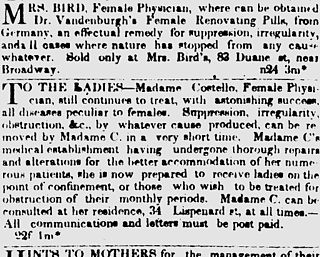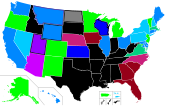Related Research Articles

Abortion in Canada is legal throughout pregnancy and is publicly funded as a medical procedure under the combined effects of the federal Canada Health Act and provincial health-care systems. However, access to services and resources varies by region. While some restrictions exist, Canada is one of the few nations with no criminal restrictions on abortion. Abortion is subject to provincial healthcare regulatory rules and guidelines for physicians. No provinces offer abortion on request at 24 weeks and beyond, although there are exceptions for certain medical complications.

Abortion in the Netherlands was fully legalized on 1 November 1984, allowing elective abortion up to the 24th week of the pregnancy. Abortion for "serious medical reasons" can be performed after 24 weeks. There used to be a mandatory five-day waiting period for abortions done after one's menstrual period is 17 days overdue. However, on 21 June 2022, Dutch parliament approved a law to scrap the mandatory five-day reflection period before undergoing an abortion, saying women with a joint consultation with the doctor, should be able to determine the time before making a decision. The law went into effect in January 2023.

The practice of induced abortion—the deliberate termination of a pregnancy—has been known since ancient times. Various methods have been used to perform or attempt abortion, including the administration of abortifacient herbs, the use of sharpened implements, the application of abdominal pressure, and other techniques. The term abortion, or more precisely spontaneous abortion, is sometimes used to refer to a naturally occurring condition that ends a pregnancy, that is, to what is popularly called a miscarriage. But in what follows the term abortion will always refer to an induced abortion.
Abortion is illegal in El Salvador. The law formerly permitted an abortion to be performed under some limited circumstances, but in 1998 all exceptions were removed when a new abortion law went into effect.
Abortion in Romania is currently legal as an elective procedure during the first 14 weeks of pregnancy, and for medical reasons at later stages of pregnancy. In the year 2004, there were 216,261 live births and 191,000 reported abortions, meaning that 46% of the 407,261 reported pregnancies that year ended in abortion.
This is a timeline of reproductive rights legislation, a chronological list of laws and legal decisions affecting human reproductive rights. Reproductive rights are a sub-set of human rights pertaining to issues of reproduction and reproductive health. These rights may include some or all of the following: the right to legal or safe abortion, the right to birth control, the right to access quality reproductive healthcare, and the right to education and access in order to make reproductive choices free from coercion, discrimination, and violence. Reproductive rights may also include the right to receive education about contraception and sexually transmitted infections, and freedom from coerced sterilization, abortion, and contraception, and protection from practices such as female genital mutilation (FGM).
Abortion in Japan is allowed under a term limit of 22 weeks for endangerment to the health of the pregnant woman, economic hardship, or rape. Chapter XXIX of the Penal Code of Japan makes abortion de jure illegal in the country, but exceptions to the law are broad enough that it is widely accepted and practiced. Exceptions to the prohibition of abortion are regulated by the Maternal Health Protection Law that allows approved doctors to practice abortion on a woman if the pregnancy was the result of rape or if the continuation of the pregnancy endangers the maternal health because of physical or economic reasons. Anyone trying to practice abortion without the consent of the woman will be prosecuted, including the doctors. If a woman is married, consent from her spouse is also needed to approve abortions for socioeconomic reasons, although the rule doesn't apply if she is in a broken marriage, suffering abuse, or other domestic issues. Despite the partner's consent not being necessary for unmarried women and women who were impregnated by abusive partners or through rape, many doctors and medical institutions seek a signature from the man believed to have made the woman pregnant for fear of getting into legal trouble, rights advocates say.

The legality of abortion in the United States and the various restrictions imposed on the procedure vary significantly, depending on the laws of each state or other jurisdiction, although there is no uniform federal law. Some states prohibit abortion at all stages of pregnancy, with few exceptions; others permit it up to a certain point in a woman's pregnancy, while some allow abortion throughout a woman's pregnancy. In states where abortion is legal, several classes of restrictions on the procedure may exist, such as parental consent or notification laws, requirements that patients be shown an ultrasound before obtaining an abortion, mandatory waiting periods, and counseling requirements.
Abortion is the termination of human pregnancy, often performed in the first 28 weeks of pregnancy. In 1973, the United States Supreme Court in Roe v. Wade recognized a constitutional right to obtain an abortion without excessive government restriction, and in 1992 the Court in Planned Parenthood v. Casey invalidated restrictions that create an undue burden on people seeking abortions. Since then, there has continued to be an abortion debate in the United States, and some states have passed laws in the form of regulation of abortions but which have the purpose or effect of restricting its provision. The proponents of such laws argue they do not create an undue burden. Some state laws that impact the availability of abortions have been upheld by courts. In 2022, Roe and Casey were overturned by the Supreme Court in Dobbs v. Jackson Women's Health Organization, meaning that states may now regulate abortion in ways that were not previously permitted.
Abortion in Thailand is legal and available on-request up to 20 weeks of pregnancy. Abortion has been legal up to at least 12 weeks of pregnancy since 7 February 2021. Following a 2020 ruling of the Constitutional Court which declared a portion of the abortion statutes unconstitutional, the Parliament removed first-term abortion from the criminal code. Once strict, over time laws have been relaxed to take into account high rates of teen pregnancy, women who lack the means or will to raise children, and the consequences of illegal abortion.

Abortion in South Korea was decriminalized, effective 1 January 2021, by a 2019 order of the Constitutional Court of Korea. It is currently legal throughout pregnancy, as no new law has been enacted. Thus there are no gestational limits or other restrictions.
Abortion in Vietnam is legal until 22 weeks of pregnancy and provided free of charge by the state through Article 44 of the 1989 Public Health Protection Law. Vietnam also has one of the highest rates of abortion that has been surveyed in the world and its abortion laws are among the most liberal in Southeast Asia and the world.
Abortion in Ghana is banned except when there is a valid exemption. The abortion should also be conducted only at a government hospital; registered private hospital, clinics registered under the Private Hospitals and Maternity Homes Act, 1958 and a place approved by the Minister of Health by a Legislative Instrument. Illegal abortions are criminal offenses subject to at most five years in prison for the pregnant woman who induced said abortion, as well as for any doctor or other person who assisted this pregnant woman in accessing, or carrying out, an abortion. Attempts to cause abortions are also criminal, as are the purveyance, supply, or procurement of chemicals and instruments whose intent is to induce abortions.
Abortion in Hawaii is legal. 66% of adults in Hawaii said in a poll by the Pew Research Center that abortion should be legal in all or most cases. Hawaii began allowing abortion care de jure in 1970, the first state to do so. State law enacted at that time stated said, "the State shall not deny or interfere with a female's right to choose or obtain an abortion of a nonviable fetus or an abortion that is necessary to protect the life or health of the female."
Abortion in Ohio is legal up to the point of fetal viability as a result of abortion rights being placed into the Ohio State Constitution by November 2023 Ohio Issue 1.
Abortion in Maryland is legal at all stages of pregnancy. The first laws regulating abortion in the state were passed in 1867 and 1868, banning abortion except by a physician to "secure the safety of the mother." Abortion providers continued to operate both within and outside of the law. Legal enforcement became more strict from the 1940s through 60s, with numerous police raids on abortion providers. In 1968, Maryland passed a liberalized abortion law that clarified the wording of the previous law, allowing abortion in hospital settings in cases of rape, severe fetal deformity, or when life and health were endangered.
Abortion in Guam is legal under territorial law, but the absence of abortion providers in the territory means that it is effectively impossible to receive abortion services.
Abortion in Puerto Rico is technically prohibited on request, although it is de facto allowed without a clear limit. On June 22, 2022, the Senate passed a bill limiting abortion to 22 weeks, with exceptions for danger to the mother's life, fetal defects, and if the fetus would not be viable. The bill will need to be considered by the House.
Abortion in the United States Virgin Islands is legal on request up to 24 weeks of pregnancy, and afterwards only in cases that endanger the life or health of the mother. There are five clinics in the territory. Women travel from the British Virgin Islands for abortions because it is illegal there.
In Lesotho, abortion is illegal unless the pregnancy poses a risk to life or health.
References
- ↑ "Cultural factors complicate Zika prevention in American Samoa". NBC News. Retrieved 2019-05-29.
- 1 2 3 4 Arndorfer, Elizabeth; Michael, Jodi; Moskowitz, Laura; Grant, Juli A.; Siebel, Liza (December 1998). A State-By-State Review of Abortion and Reproductive Rights. DIANE Publishing. ISBN 9780788174810.
- 1 2 3 4 "Code Annotated". www.asbar.org. Retrieved 2019-05-29.
- 1 2 "EMERGENCY CONTRACEPTION IS NOT AN ABORTION PILL". www.samoanews.com. 2014-06-27. Retrieved 2019-05-29.
